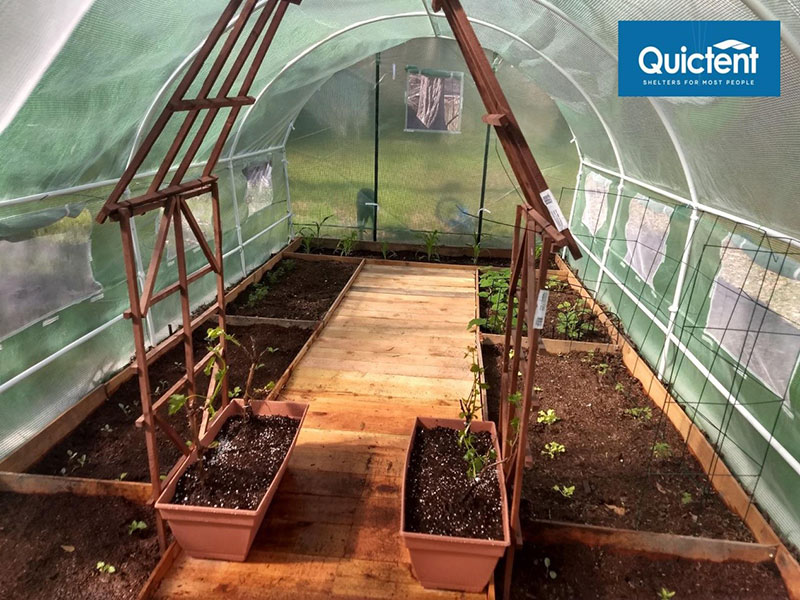Advertisement
If you are a gardener with allergies, you may face challenges when gardening in the fall and winter. We know that to keep plants warm and protected from high winds and rain and snow, it is ideal to move plants indoors, for example, a large greenhouse kit or a warm indoor Quictent grow tent.
Seven tips to help you avoid allergies
Choose the right plants
Healthy indoor plants add to your gardening pleasure and minimize the chances of allergies. You should avoid plants that tend to collect dust or release pollen, such as chamomile, chrysanthemum, African violet, hyacinth, and so on. These flowers are colorful and great for gardening and decorating a room, but unfortunately, they are not suitable for a gardener with allergies. If you accidentally get too close to them while working, the pollen may induce your allergy symptoms, leading to worse consequences.
Recommended plants for you are daffodils, tulips, hydrangeas, verbena, etc. These plants have a lower chance of inducing allergies and are friendlier to gardeners who suffer from allergies, so you can make them your choice. Just in case, you’d better consult with your doctor for plant advice before planting.
Tip: Choose native plants as much as possible, you know them better. Out-of-town plants will cost you more energy and may produce more pollen because they are not adapted to the climate.
Use ground cover plants
In winter, many gardeners move plants into greenhouses to protect plants and increase production. To keep plants warm, a common method is to set up compost. However, for gardeners with allergies, some common materials can induce allergies, such as wood chips and other mulching. Although mulch retains moisture, it also promotes mold growth.
To stay hydrated, you can also use ground cover, gravel, oyster shells, etc. While there’s no guarantee you’ll avoid allergies, these plants and items can help.
Grow potted plants
Potted plants are the safest plant choice for most gardeners. If you are particularly prone to allergies or if you wish to grow plants in grow tent, potted plants are the best choice.

Few gardeners will have allergy symptoms when caring for potted plants, and they are easy to grow and take up little space, making them suitable for all gardeners.
Take protective measures
When pruning and watering plants, plant sap and thorns (such as roses) can hurt your skin. Even contact with certain plants can directly induce allergies. The most direct way to protect yourself in this situation is to add a layer of cover to insulate your skin from the plants.
Most dermatologists recommend that gardeners with allergies do the following before they begin gardening.
Wear gloves (preferably thicker ones)
Wear a long-sleeved shirt, long pants, and long socks
Wear a mask (to prevent pollen from entering the nose and mouth)
Most importantly, remember to take anti-allergy medication before the start of the gardening season to prevent allergies from occurring.
Avoid bug bites
Although we are talking about indoor gardening here, you may still encounter bug bites while gardening. It’s not a big deal, but it can be uncomfortable. Certain poisonous insects may also release fluids to trigger allergies.
What we can do are:
Check the vents in the greenhouse to make sure they are closed. The Quictent portable greenhouse has multiple vents and comes with easy-to-use zippers.

Spray work clothes with an insect repellent containing DEET in advance.
Try gardening in the afternoon and finish before dusk. The bugs are inactive during this time.
Gradually increase gardening hours
Indoor gardening can greatly reduce the likelihood of allergies. If you are prone to allergies, it is recommended that you do not spend too long on gardening at one time. You can try gradually increasing your gardening time, for example, limit your activity to thirty minutes or less at the beginning, or 15 minutes or less, and do this twice a day. If this is acceptable to you and you are not significantly unwell, you can extend the time appropriately.
Good health can be very beneficial in preventing allergies. Some claims are that gardening can make people healthier, but it is better to err on the side of caution so that you can have more fun gardening without being affected by allergies.
Wash your hands and shower after gardening
Whether you garden once or twice a day, wash your hands and face immediately after each session. You’re better off washing outdoors to avoid bringing mold and pests indoors. Change your clothes and wash them promptly after a day of gardening. You should preferably shower before bed to prevent itching and other allergy symptoms on your body. You’d better wash your hair to prevent pollen from your head from getting into your pajamas and bed.
Conclusion
Don’t give up gardening because of allergies. Here are some suggestions for you for your healthy gardening. Just pay attention to a few details while working and you won’t feel bad. Of course, you can seek more detailed advice from professionals.

